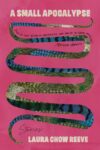 The following interview is with Jen George, author The Babysitter at Rest (Dorothy, 2016). You can read Chelsea Hogue’s review of the book here.
The following interview is with Jen George, author The Babysitter at Rest (Dorothy, 2016). You can read Chelsea Hogue’s review of the book here.
This interview first appeared in the Full Stop Quarterly, Issue #5.
Chelsea Hogue: Do you write as if the real and the fantastic are one?
Jen George: I don’t really think about one or the other when I’m writing, so the concept of either—or the separation between the two—is maybe irrelevant or else collapsed when I’m actually working. I think the fantastic is present in my work in a sort of literal sense, as fantasy—the fantasies of the people populating these worlds, the fantasy of the worlds themselves, even the fantasy of writing as the writer. Whatever someone is doing when making art—I mean for all the complicated reasons people are compelled to make things—I’m interested in the idea that to some extent they’re pursuing or exploring or resolving or exorcising their own fantasies. There was some point where I sort of involuntarily started reading everything, like all art, as the artist’s fantasy and I think that coincided with writing this book. It’s a funny way to look at art—especially work that takes itself very seriously—and it’s too reductive and irreverent to be total, but that perspective kind of makes things lighter and more recognizable by generating a different intimacy with the work than the intimacy that’s created just through understanding the work on a more visceral or energetic or intellectual level. I guess I think the real and the fantastic are reciprocal in the sense that reality creates a need for fantasy and fantasy is facilitated by the gravity of reality—the natural meeting point of the two is art. In this book I suppose they’re one, although I think my work is more rooted in reality than fantasy.
All of your characters seem to be thickened by the same material: estrangement. Sometimes this appears to be a lapse in memory, as if one of the simple steps which create the performance of living was forgotten or omitted, and now the whole parade is askew. Or it feels like a heightened sensibility, which might look like naïveté, but actually takes hyper awareness and vigilance. Of course, I’m concerned with your writing process, the methods and modes of thought which built The Babysitter at Rest, but I’m also interested in something you once said about all of this, the subconscious performance: “We learn how to order our worlds and language so that we can understand our surroundings and function and fit into the world we’re perceiving.” What role does memory play for you? As a reader, human, writer of this book, whatever?
My concern with the role of memory in this book is sort of based in the idea that one of the functions of both linear and abstract memory is to connect us to place and to time and to people and to ourselves. Memory is kind of at the root of this cycle of anxiety and estrangement and loss and desire that I find myself thinking about a lot. I’m interested in what happens when the things that create linearity in a life—memory, memorization, the performance of learned behavior and language and tasks—break down. I think I was interested in removing the narrative element of memory in terms of how it provides history, or identity, or the way it creates meaning, or the way it makes sense of things. When memory is absent it’s not entirely clear what takes its place. I’d think we’d like to think that forgetting has the possibility to make things lighter or maybe new, like we can move from a new place once that burden is gone. The absence of memory might free you from certain painful or uncomfortable things, but it also might create an estrangement or disconnect between the individual and themselves or other people or the world. I think a strong sense of community or belonging has always been elusive for me, both in a smaller social way and also in a larger existential or spiritual way, so I have this longing to understand how the systems or practices that connect people to other people or to things work. The people in this book are filled with this unspecified desire and there’s this sense that if they can memorize or perform these certain behaviors or patterns or thoughts in the way that other people who seem to not have a problem living life do, then maybe they get to feel integrated, maybe things get to make sense. They’re maybe trying to get the math of those behaviors or patterns, but there’s just a fundamental failure to understand or to act naturally or to see the simplicity in life. The ways they’ve learned to order their worlds are kind of always falling apart or were never sound in the first place. There’s this anxiety of not having the ability to perform satisfactorily, let alone well. It’s like a failure to conform to being a capitalist or, in a more active sense, a kind of quiet rejection of the system, even though this larger longing that’s one of capitalism’s more abstract products persists. In this kind of sensitive or hyper aware state—where looking at the mechanics of life leads to a sort of existential or spiritual crisis—I think that anything outside of solitude or true intimacy requires a sort of performance. When that very basic ability to suspend questioning the order of or reason for things that we learn so early on fails, the collapse in the performance of the choreography required to live in the world occurs, and the breakdown shows how fragile the psychic and physical and emotional ties that bind people to the world are.
Would you describe these characters as desperate? What is desperation?
Not really, just because I think with desperation there’s some exhausting of resources or going to drastic measures to get something one feels they need or want—there’s a clear objective and there’s some attempt at solution or resolution that I think is very absent from the characters in this book. Like to me, Hamsun’s Hunger is a (very funny) book about desperation, at least the beginning is—lots of things not going as intended when there is a very clear intent. Clarice Lispector deals with desperation in a lot of her work. There has to be some degree of action and hustle at some point—whether it’s in the narrative or not, for there to be desperation. The characters in Babysittter are not hustlers in any sense, they’re not even failed hustlers, there’s probably been no hustle at any point in or outside of the frame. They’re just like the opposite of hustlers. Desire, rather than desperation, is the predominant state of the characters in this book. I think it’s in this cycle of longing and performance of identity, not the action to achieve or possess or resolve anything, that these characters exist.
As I’ve thought about these stories, and I’ve thought about them a good deal, I admit that I haven’t once thought of their endings. This could be because they often don’t do that so definitively, end.
I think of these stories as sort of ongoing circuits, like these narratives and worlds keep going. I prefer a certain lightness at the end of anything I write—like the cycle of the narrative could possibly start over, the beginning and end are not so different from one another, or like you don’t really know where you’re being left off. Making anything is something like holding a séance in that you’re inviting energy in and you’re a sort of vessel for that energy, but you’re not in total control. I guess the difference with writing is that it’s almost entirely psychic – you’re not dealing with other people or with objects or with physicality the way filmmakers or performance artists or sculptors are, you’re just in your head, so sometimes there’s the illusion of more control. You’re getting in touch with some energy that isn’t present until you will it or make space for it or invite it in, and then that energy, once it comes, has a progression of it’s own and contains so many joined and involved things that you, as a writer or whatever, can’t really impose too much on it in the way of linearity or resolution without disrupting the energy in a detrimental way. I think try to be free of imposing anything too unnatural onto the writing.
Does that mean you try to write past knowledge?
I think I just see all these elements as part of knowledge. I’m interested in how skill and intent and intuition work together. You can be open to more abstract forms of knowledge, but you have to know what to do with it once it’s there. I don’t write just to see what’ll happen. I’m not interested in hippy art. I’m in conversation with certain things and I work to get all of those things into a unified place. When I write I go in having thought about very specific ideas to an obsessive degree, I’ve thought about how to deal with those ideas through narrative or voice or whatever, and all of the many aspects of what I’m thinking about, all of things I’m in conversation with, are distilled in the writing. But, for all of that intention, for all of that knowledge, I’m equally interested in the more esoteric aspects of making anything, in what happens in the writing itself when all of these things you carry in alchemize with some other energy that you can’t anticipate or control and the way those things become part of the work.
What was growing up like?
I grew up in the suburbs of Southern California. I had a lot of siblings and our family had very little money and my dad worked several odd jobs to make a living and those things were sort of in conflict with the norms of the town we lived in. The world around me was saturated in a sort of dull and impassive celebrity/beauty/wealth worship since it was in close proximity to Hollywood. Homogeneity and propriety and appearance and money were highly valued. It was difficult for me because I was sensitive and anxious and thought about things too much and I just felt strange in the world, like I came to the wrong place, so I kind of lived in my imagination and didn’t have many friends and didn’t fit in very well. I had a lot of daydreams about being a nun.
What’s your relationship to outsiderdom now?
I don’t consciously think of myself as an outsider, especially not when I’m working or when I’m engaged with other work that resonates with me. I’m probably, like in an objective way, an outsider in a professional or financial sense- I didn’t get my MFA, I’ve never had any type of career, I know very few people in the writing world, conceptually I’m probably not engaged with the work most contemporary writers are, I don’t make a living through writing, my work is read by very few people. The outsider position was maybe not necessarily a choice but it became familiar early on, so I’m comfortable outside of the straighter ways of functioning or operating or working even though it can be unsteady. People who have existed on the fringes in their lives and in their work and have still managed to make things are compelling to me—I try to keep persistence and vision in mind, especially since I don’t make a living from writing and I struggle to find adequate time to work.
How are you writing the novel you’re currently working on?
I guess I’m writing it the way I write anything—I’m compelled by some energy, I think about it all the time, I write a lot of material, and then at some point I start distilling and refining what I have and thinking about it in a new way. I’m still in the early stages of writing, which for me means having tons of files that are basically ideas or energies I’ve been obsessed with. The process is more intuitive than pragmatic. I kind of need all this material before I can start thinking about a shape, though I have a larger narrative in mind. It’s still at this very experimental and expansive point.
Do you see throughlines in your obsessions? Say, from The Babysitter at Rest to the present project? I know you’ve also worked on film before. Do you find yourself compulsively returning somewhere?
I’m still thinking about desire a lot. I think Louise Bourgeois said—well, I think she was quoting someone else—that all artists have only one idea. I think I agree with that. There are limited ideas and maybe only one per person, but there are endlessly deep and complex and new ways to approach whatever your idea is.
Chelsea Hogue writes and teaches in Western Massachusetts. Her fiction and nonfiction have been published in The White Review, The Collagist, Quarterly West, and Autre Mag, among others.
This post may contain affiliate links.







